Side scan saved the day. the weed, sand and mud edges were easily seen. The little sand dip in the weeds is where we found walleyes. They were on the sand right next to the weeds.
No wind, clear water and sunny. Only bass shallow so we looked deeper and found some at 22 foot.
Top arrow is mud
2nd arrow is sand
3rd arrow is weedlines
Bottom arrow is weed dip

We were using spot lock to cast for walleye and Levi said look at the sonar. I quickly reeled up and dropped my jig and caught a 4 lb largemouth bass. The 2nd photo is the bass swimming away after I released it.

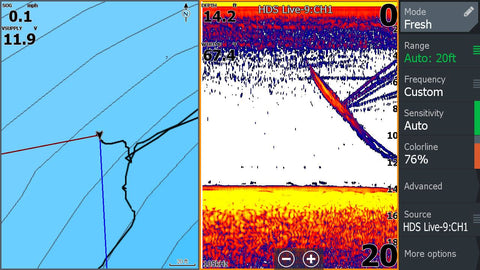
Notice the 2 bright yellow arches (green arrow) in the red bait (black)

I looked at lots of areas and didn't see any fish and caught fish. But here is one example where the fish showed up.

Fish in vegetation, you don't have to see fish to catch them. I often don't mark fish in weeds but still catch them like this one. I spotted the fish with my Aqua-Vu and dropped my bait near the camera!


Green arrow shows nice fish on down imaging but looks small on 2D. It is probably on the edge of the 2D cone and the DI cone is wider so shows the fish better.
Reason to run DI and 2D sonar. I also use Navionics on my Lowrance and LakeMaster on my Humminbird. DI (down imaging) is better in weeds most of the time.

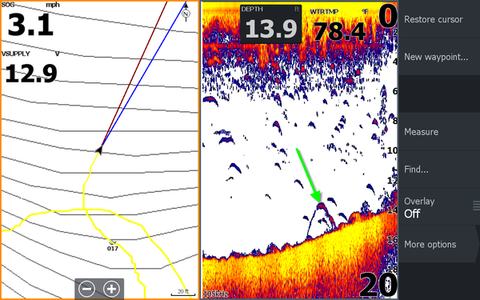
My Garmin PS30 shows the distance to the side the fish are.
Green arrow 3 feet to the left of the transducer which is mounted on boat's mid-line.
White arrow 8 feet to left.
2D sonar only tells you how far off the bottom and that the fish in the cone somewhere.


#6
Red circle fish
Black arrow weeds
Green arrow small boulders on hard bottom point.
Blue arrow bait balls that create shadows on side scan.

This should help get started in interpreting your sonar.


Using sonar, down imaging, Lowrance, Humminbird, and Aqua-Vu to study fish
Mostly fun and a little education.
Just another example on why down imaging helps sonar interpretation. The weeds look similar to fish.
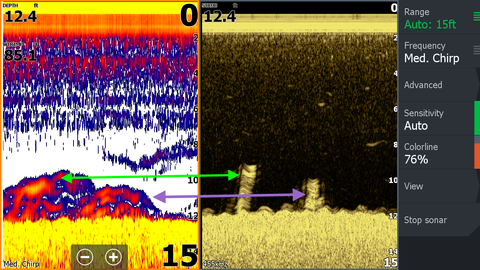
In this one the fish look like weeds.
I use sonar to find fish every time I go out but sometimes the fish can hide. Two good examples are boulders and steep drop-offs. The sonar beam is reflected off the bottom on steep drops and off the boulders and the fish can’t be separated.
I drove over this drop-off that had boulders and didn’t see any fish with either the Humminbird or the Lowrance.

I stopped on the edge and used the Spot Lock feature of my Minn Kota trolling motor on the edge and dropped my Aqua-Vu camera down and found these crappies but not just here but each time I moved along the edge there were more crappie.
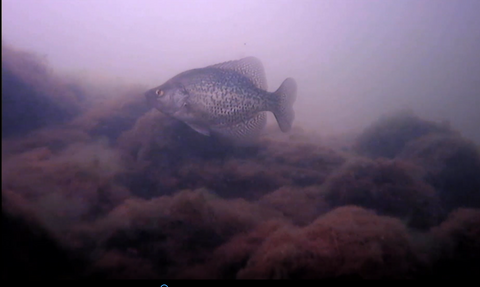
Even the down imaging couldn’t separate the crappies from the boulders while I was sitting over them.
Notice the crappies are very close to the boulders in the video.
They did bite and they posed for the camera before being released (I had fresh walleye back home).
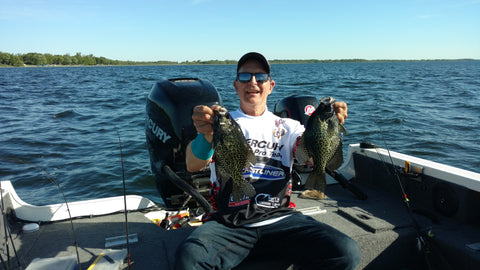
I produced this short video using sonar, down imaging and an Aqua-Vu to show you how I interpret sonar.
Click on image to view video
Watch the short video to get an understanding why weeds are important for fishing.
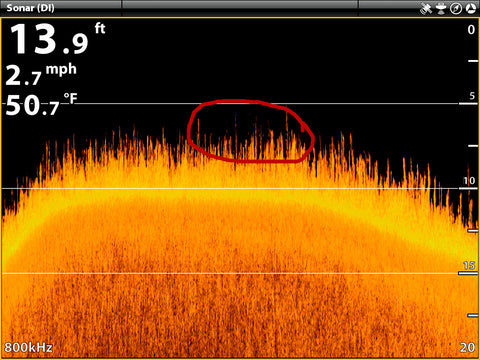
Ever wonder what to do when you are slowly moving jig or rig fishing and lose the fish on sonar?
I had these fish near weeds located with down sonar (2D and down imaging).


If they disappear I look at the side imaging on a different screen to see if they are left or right. Like this image.
I place the cursor on the fish on the side imaging and create a waypoint and then move the boat to the fish before they move too far. It is easy, once you catch a few fish this way you add it to your fishing tools.
